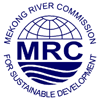 |
 |
MRC and USAID Support Transboundary Cooperation
MRC No.05/07
Hanoi, Viet Nam
Monday, 23 April 2007
HANOI, VIETNAM (April 23, 2007) – The Mekong River Commission (MRC) and the United States Agency for International Development (USAID) have launched a programme of cooperation addressing transboundary issues in the Mekong River basin. Dr. Olivier Cogels, Chief Executive Officer of the Mekong River Commission Secretariat, and Mr. Olivier Carduner, Mission Director of USAID’s Bangkok-based Regional Development Mission for Asia, signed the new cooperative agreement to assist MRC member countries in joint planning, cooperation, and prevention of transboundary issues in Hanoi, Viet Nam, today.
As the Mekong sub-region develops the need for joint planning and cooperation will increase, particularly where a development in one country could have consequences in another. Sustainable management of the water resources in the lower Mekong River basin is vital to the 60 million people who depend on the water resources for their daily livelihoods. It will be important for Mekong River countries to implement policies and practices that encourage participatory and collaborative engagement for planning and development. Sustainable development will protect vital ecosystems and promote economic and social prosperity, and facilitate the prevention, management and mitigation of transboundary issues.
Under the MRC Strategic Plan for 2006-2010, the MRC is working to enhance effective regional cooperation through the “development of dispute resolution and compromise mechanisms such as co-management, public participation, stakeholder involvement and institution building.”
The new cooperative agreement aims to support the development of institutional arrangements, tools and skills for strengthening regional cooperation and addressing areas of potential conflict.
Through its regional Environmental Cooperation-Asia (ECO-Asia) Program, USAID will cooperate across the full range of MRC programmes engaged in or planning activities in conflict management, particularly the Flood Management and Mitigation Programme (FMMP), Environment Programme (EP), and the International Cooperation and Communication Section (ICCS).
USAID, in partnership with the Secretariat, National Mekong Committees, and line agencies, will organize a series of activities designed to further strengthen the capacity of the Secretariat, the National Mekong Committees, and line agencies in conflict prevention and management. Through this collaboration, the MRC Secretariat and USAID will facilitate counterpart exchanges and cooperation between Mekong countries to promote sharing of best practices in the management of transboundary issues and the development of tools and strategies for addressing potential conflict.
Dr Cogels welcomed USAID’s support saying that Cambodia, Lao PDR, Thailand and Viet Nam, the four member countries of the MRC, had a long history of cooperation and would be pleased with any assistance which promoted peaceful development within their region. “The people of the Mekong Basin need to make better use of their water resources if they are to meet their goals of poverty alleviation, but they are aware of the necessity of careful planning and consultation prior to this development. With this new programme we will be better equipped to help our members dispel any potential transboundary issues before they arise,” he said.
Mr Carduner said USAID was very pleased with the opportunity to collaborate with MRC to assist Member Countries in the joint planning, cooperation, management, and prevention of transboundary issues in the Mekong River basin. “USAID strongly supports the efforts of the Mekong River Commission and the National Mekong Committees to advance the MRC's agenda for regional cooperation, and looks forward to opening this new chapter in our long-standing relationship with the MRC,” he said.
--- END ---
Choose a newsletter: